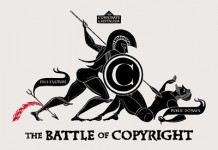 The election of Jean-Claude Juncker as the new President of the European Commission has brought the debate on a single European copyright term to the fore – literally. Questioned by MEP Julia Reda, “on behalf of the Pirate Party,” Juncker said: “We need to realize a growth and employment opportunity in the development of the digital single market and we need to stop … the fragmentation of the European digital world … We have too many regulatory systems, we have too many national embellished and colored regulations that must [be] … simplified, and be harmonized, so that we can take advantage of the digital opportunities that exist.”
The election of Jean-Claude Juncker as the new President of the European Commission has brought the debate on a single European copyright term to the fore – literally. Questioned by MEP Julia Reda, “on behalf of the Pirate Party,” Juncker said: “We need to realize a growth and employment opportunity in the development of the digital single market and we need to stop … the fragmentation of the European digital world … We have too many regulatory systems, we have too many national embellished and colored regulations that must [be] … simplified, and be harmonized, so that we can take advantage of the digital opportunities that exist.”
In fact, European Commission thinking on the issue is more accessible than usual, because a European Commission policy white paper on “A Copyright Policy for Creativity and Innovation in the European Union” has already been leaked in a full advance draft form, available here.
European Union copyright law has in fact functioned as a derivative of the 1886 Berne Convention, with a common copyright term duration of 70 years as agreed in the 1993 Copyright Duration Directive. This period was apparently chosen to fulfill original Berne Convention goal of two generations after the death of the creator – adjusted to accommodate longer lifespans. A European Directive 2006/116/EC of 2006 has superseded the original Directive without altering the term.
The white paper makes the usual case for the economic value of copyright as protection for European creative industries, and “an important driver of growth and employment in Europe,” while also referring to the “intense and, at times, confrontational discussions” around copyright. The new white paper seeks to further the EU goal of a “single digital market.” However, it makes a number of assumptions that might betray media industry lobbying, and that certainly have been challenged elsewhere. One is the contention that lowering the level of copyright protection “would reduce creators’ ability to reap the gains from their work – and producers’ and publishers’ capacity to recoup the investment needed to bring works to the market. ” Now, one London School of Economics study argued that measures against piracy brought little benefit to creative businesses. Another study showed that longer copyright terms actually made creative works unavailable.
Alas I haven’t found any guidance on the specific question of copyright term, and any changes to this. There could be room for concern, though, that the U.S. might exert pressure on the EU to adopt the same 125-year term that U.S. copyright extension lobbyists have already secured in the U.S. – in the same way as the U.S. is apparently doing now in Canada.
The white paper focuses more on other issues, especially copyright title. “There is no unitary copyright title in Europe, so works are protected on the basis of 28 national legislations,” it states. Out of the various solutions to this problem, the answer it recommends is “a single unitary copyright title” for the single European market, and lays out the benefits in terms of lowering business costs and enhancing accessibility and enforcement of rights.
Legislators can sometimes act against industry vested interests, even in areas like intellectual property where so far they’ve shown a poor record in doing so. The Obama administration has apparently withdrawn its support from Phil Johnson, the controversial nominee for head of the U.S. Patent Office, who was expected to take a line favorable to the trolls already disfiguring the U.S. patent system. It’s to be hoped that EU legislators take a similarly broad view when they finally move to discuss this issue.

































